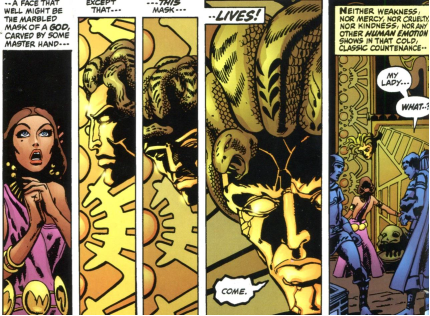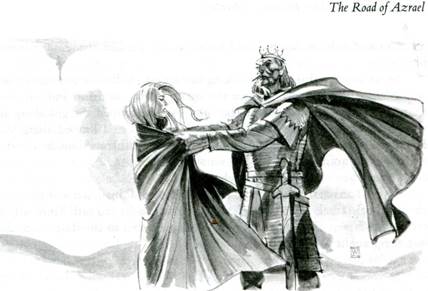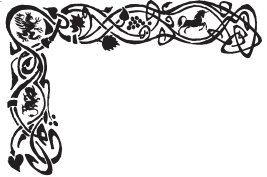(sketch due)
-- Robert E. Howard to H. P. Lovecraft, Sep/Oct 1933
This quote by Howard seems to point to medievalism, and his description of himself as a “romantic emotionalist.” As I see it it is a classical mentality that says freedom doesn’t exist without its counter, order. There is ever a balance there, and it is this balance that is irresolvable. That is a medieval mind but, again, a classical mind – just not a modern mind because everything in the world of facts is resolvable and there can be no ambiguity when, actually, ambiguity is the superpower of nature, the male and female psyches that are ever a foreign land.
Ambiguity is needed in order to have unambiguous meaning – see Pictorial 5 - this is what the medieval and classical mind accepted because they invested such idealism in the human figure; whether a figure is classical or medieval Christian, a force for ethical value, male and female.
The Greeks, despite their rationalistic slant, strike one as romantic idealists and, in any event, their philosophies were at the heart of medieval societies. The heroism and romance of the human figure in unresolved nature is at the heart of Greek myth and legend and this essential ambiguity provides us with a fantastic resource for unambiguous meaning.
Facts by this reckoning are the enemy of meaning because they exist in a transformative maze where the physique is weak and listless; a psychotic burgeoning of unconscious effusions. Outside the transformative maze the female is the bearer of life, and there is no struggle (Pictorial 5 aerie, life is grim and also gay and carefree).
The struggle exists in the transformative maze which is the harbinger of facts and not of balance and proportion. Facts quite often enter a transformative maze because it is the area where things are resolved. It could be DNA, the dollar, the type of government (Pictorial 9). What is right for the maze is wrong for the unresolved state, which is the state that existed up to WWI. At that point all the ancient imperial orders became defunct – the Ottomans, the Hapsburgs and Russian Tsars (Pictorial 7) but it makes best sense to hark back to a classical and medieval heritage that is where most of Howard’s historical tales are set (including tales such as The Lost Valley of Iskander which was adapted into the Conan comic).
If facts say that you have to consume to be happy that is a type of psychic weakness, and is because we live in a transformative maze of reason and pleasure. “They” will tell us that the facts of reason are applied to pleasure. We, with our bodies and psyche, can step outside the maze and say, no, we believe in fortune, in destiny, in the stars above.
The human figure is created by the universe and has psychic lustre; the denial of this is a lie. So what is the truth? That we choose to believe not in paltry facts but in ideal balance and the dream of the universe, the proportions of the human figure. The proportions of the head to the body; the psyche that weaves between reason and balance; the female serpent (anima – Pictorial 1). The eternal balance between male and female that is in the reality of a ballad. This is not a factual world; it is the romantic order that existed up to WWI.
Since then, legend has faded into the background and is seen mainly in films, such as the aforementioned ’55 blockbuster The Ten Commandments. I saw that the other day and, despite the date, it’s a quite modern film. Its literalness means that when Moses pulls off another miracle we are in a parallel reality rather than something like an allegory.
The patriarchal authority is very evident, particularly in lines like, “There is no freedom without the law” (the scene with the golden calf). But, since the events are in the realm of legend – about the same time as Homer’s Troy – their legendary status is lost to literalism. Legend has a force that is not factual – a psychic realm of sheer will. It occupies reality and not a parallel reality of special effects. Parallelism has become so prevalent nowadays that perhaps we have lost the capacity to see it for what it is. It means you are not dealing with a physical reality, a psychic force, but a parallel one of “effect”.
As I said before, Trump may be clever on the economy, but he lives in a completely parallel universe, apparently streaming CNN, Fox and other news outlets while issuing continual tweets. That is not a physical reality of psychic force, it’s facts and figures. Behind Trump are the “grey men” of the Fed and their current leader Yellen. These people are solely dealing in “effects” on the economy – that is not reality; it’s a parallel reality of effect. The effects have very little to do with psychic balance, or the natural balance.
These are the Martians whose overlords worship the worm of the $ and they are landing everywhere on the grey, green Earth, repatriating dollars till the cows come home

Astronomical Amazon depot, Dunfermline, Fife. Note the “seasonal” hat, actually a Red Martian peak of the low-level hierarchy.
The Martian overlords, the worm of the dollar, the False Apollo (CH 3) – the worm with the human face, the face of falseness and empty distraction.

(CH 4)
A fiendish invasion of the human psyche that applies reason – the dollar, the monsters of e-commerce – to pleasure. Fiendish because the universal psyche is in a state of balance between reason and pleasure, the Jungian anima (female serpent Pictorial 1). There is a worldwide distortion that is the work of fiends in human guise who inhabit a parallel universe of the anthropoid worm.
A worm exists to consume in its lowly habitat but there is no state of pleasure, only a state of existence (psyche) so this is a gross distortion of natural principles: the dollar that worms its way into the human psyche demanding pleasure and distraction. The death of living. We, in our parallel universe of reason and pleasure (“effect”) have lost sight of the cosmic reality of balance and proportion that worms, in their kingdom of darkness, know.
Parallelism is a psychotic effusion and its effects are everywhere. I read somewhere that the Japanese are losing their will to procreate. No reflection on the land of the rising sun, but that is mysterious. The effect of Facebook seems to have its pioneers scared and worried sick that millions are succumbing to its perverse influence.
All these are simply examples of parallelisms that are nothing to do with universal reality and everything to do with “effect”. We are children of the universe and its vast spaces and lights. Humans are fortunate beings and our destiny is written in the stars. Luck and fortune cannot exist in a parallel universe where everything is “effect” and nothing is real. In the case of heroic fantasy, we have a fabulous state of psychic strength and physical lustre. Thus is written the power (ontology) and meaning (epistemology) of figures in a changing landscape.
So, finally we reach heroic fantasy – you’d never guessed, huh? Specifically Howard’s historical tales such as “The Road of Azrael”.
We struck the open desert , flying like the wind, and my heart was glad. The blood of my foe was on my blade, a good steed between my knees, the stars of the desert above me, the night wind in my face.. (Swordswoman and other Histrorical Adventures, Del Rey, page 72)
The heroic characters partake of the legendary with exclamations like, “By the saints!”, “By the beard of the Prophet!” They dwell in a psychic universe that is proportionate between reason and pleasure, men and women, that is worthy of battle. In this universe they ride bays that tread the turf wherein dwell worms of the earth. Earthworms in their lowly sphere coil and burrow because that is their state, the state of balance. It is a fortunate world of psychic lustre and fertile plains.
Everything in the tale borders on luck, where figures on horseback are moving dimly through an ever-changing landscape, dusk turning to dawn, the earth revolving in the cosmos.
And as I swooped down as a hawk swoops on its prey, I suddenly gave a shout and lowering my blade, set my steed back on its haunches, almost beside the Frank.
“Now by the beard of the Prophet,” said I, “we are well met, Sir Eric de Cogan!” (page 74)
The heroes are outward-bound and live by the ethos of the legendary lives of saints, or of the Prophet. They are in a Jungian world of symbols which weave between reason and pleasure, that have proportion, that have psychic strength. Dream and reality.
“Such eyes had Editha,” said he softly. “Aye, child, your face bears me back half a century. You shall not fall into the hands of the heathen while the last Saxon king can lift a sword. (King Harold of England, page 99)

John Watkiss illo
Home







